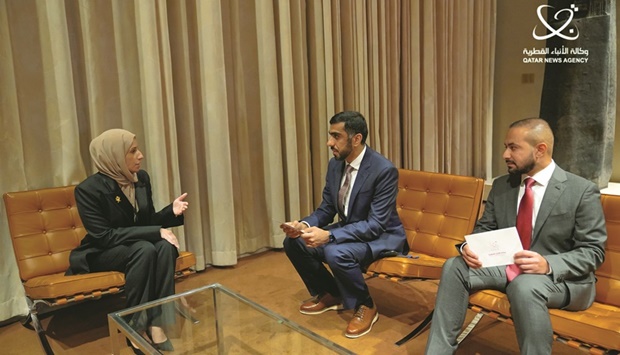HE the Minister of Education and Higher Education Buthaina bint Ali al-Jabr al-Nuaimi stressed that Qatar is one of the leading countries in the process of digital transformation in education, hailing the ministry’s necessary measures to confront the Covid-19 pandemic in record time once it first broke out globally.
She ascribed the country’s educational achievements to the importance the wise leadership attached to education, which contributed to providing an infrastructure of well-trained educational cadres, electronic platforms, communication networks, digital sources, and created students capable of dealing with modern technology.
In an interview with Qatar News Agency (QNA) in New York, HE the Minister affirmed that Qatar, under the leadership of His Highness the Amir Sheikh Tamim bin Hamad al-Thani, is playing a leading global role through its external development aid projects in the sectors of education, health and economic empowerment.
“Qatar’s unrelenting calls for the need to avert education the scourge of the ongoing conflicts around the world were widely approved by the international community, most notably the adoption of the United Nations (UN) General Assembly of the draft submitted by Qatar to adopt the International Day to protect Education from Attack in 2019, and the unanimously passed General Assembly resolution on the right to education in emergencies, a resolution submitted in 2010 by Qatar with the support of His Highness the Father Amir Sheikh Hamad bin Khalifa al-Thani, and Her Highness Sheikha Moza bint Nasser.
HE the Minister noted that the recently launched e-learning strategy aims, in a related context, to equip students with topnotch digital skills, in order to prepare them for a future that depends heavily on these skills. Asked about her view of the reality of education in the country, and her satisfaction with what Qatar has achieved, and future educational plans, she stressed on the State’s relentless approaches to achieve optimum quality assurance indicators in all inputs and outputs of the educational process in a way that meets the needs of society through fruitful efforts to achieve the sustainable development goals, especially the fourth goal and its objectives, re-imagining the future of education, and ensuring the right to education as a public benefit for all, in a manner that meets all needs and capabilities.
Commenting on the accession of dozens of Qatari schools to the United Nations Educational, Scientific and Cultural Organisation (Unesco) Associated Schools Network (ASPnet), and the advantages that these schools would obtain as a result of this accession, HE the Minister said that the network seeks to build peace in the minds of students, and to enhance the values and principles stipulated in the Unesco Constitution and the UN Charter, which include the fundamental rights, human dignity, gender equality, social progress, freedom, justice, respect for diversity and international solidarity. Qatar joined the membership of ASPnet in 1983 with one school, namely Doha Secondary School for Boys, she said, elaborating that so far the number of Qatari schools that have joined the network exceeds 100 schools, comprising the three educational cycles (primary, preparatory and secondary). She noted that the ASPnet’s main areas of work cover education for global citizenship, culture of peace, non-violence, education for sustainable development, intercultural education and appreciation of cultural diversity and heritage.
HE the Minister underscored the accession to the ASPnet membership allows schools to be part of a global community of schools, as well as twinning partnerships with partner schools in more than 180 countries, as well as participating in Unesco-organised projects, campaigns and global competitions, benefiting from the international organisation’s educational resources and being briefed on the latest developments in education and learning process.
In response to a question about the many international initiatives related to education for Qatar and their results on the ground, HE the Minister replied that Qatar, under the leadership of His Highness the Amir, is playing a leading role internationally through foreign development assistance projects in the sectors of education, health and economic empowerment through partnerships with international organisations, which confirms its commitment to the international community to contribute to providing the right to education for all, and accelerating the achievement of the Sustainable Development Goals 2030 and beyond, especially the fourth goal on quality education.
HE the Minister said that over the past 10 years, almost a billion dollars have been invested in development projects in the education sector, benefiting millions of children and young people in more than 60 countries, stressing that the permanent appeals of Qatar to take away education from the ongoing conflict in the world have received a great resonance with the international community, pointing out that this is evidenced by the response of the UN General Assembly and its approval of the draft submitted by Qatar to adopt the International Day for the protection of education from attacks in 2019, noting that Qatar submitted in 2010, with the support of His Highness the Father Amir Sheikh Hamad bin Khalifa al-Thani and Her Highness Sheikha Moza bint Nasser, a General Assembly resolution on the right to education in emergency situations, which was adopted by the General Assembly unanimously.
In this regard, she stressed that Qatar is one of the leading countries in protecting education in emergency and crisis situations and that its foreign policy is keen to support and provide development and humanitarian assistance to the affected countries in various common issues, especially providing quality education to millions of children who have lost their right to education due to conflicts, wars and disasters around the world, which makes it a role model in this field.
She highlighted that the efforts of Qatar and its pivotal role in this regard were expressed by the UN General Assembly by approving the “International Day to Protect Education from Attack” on September 9 every year.

HE the Minister of Education and Higher Education Buthaina bint Ali al-Jabr al-Nuaimi speaking to QNA.
